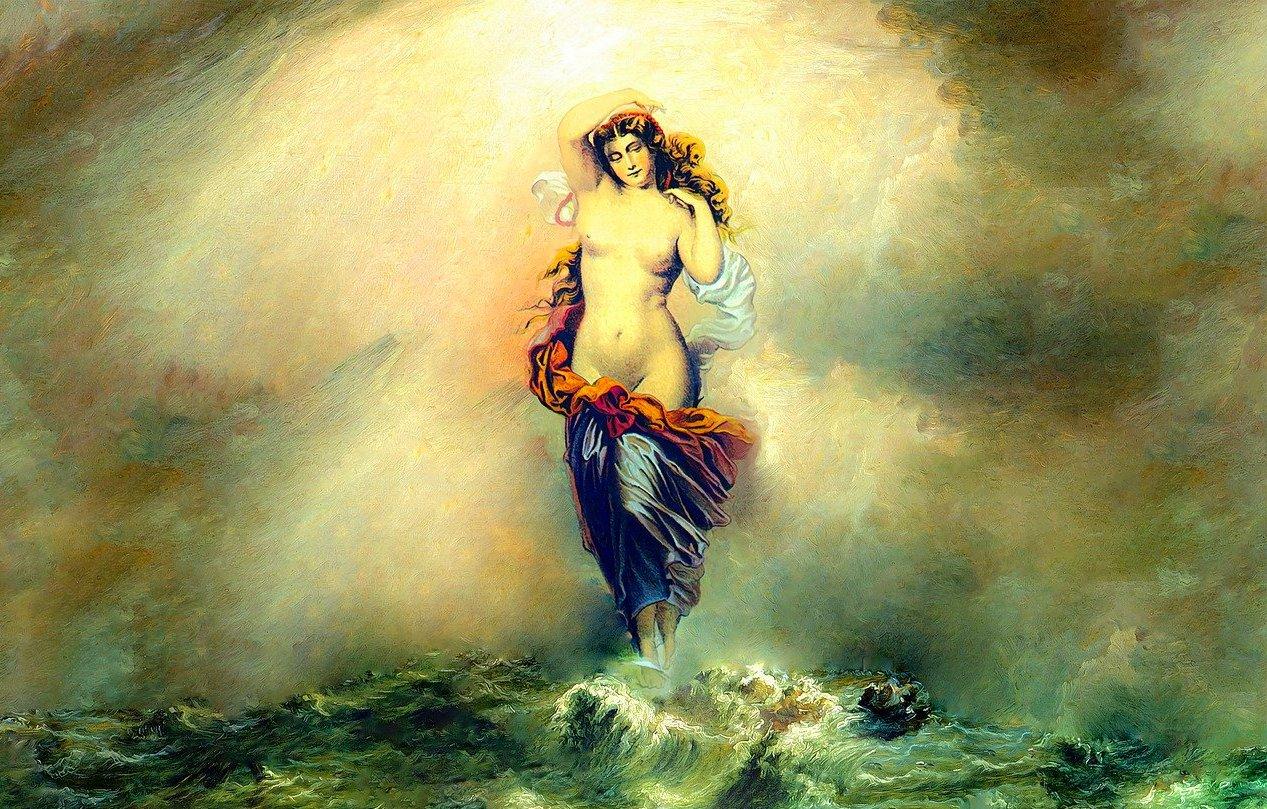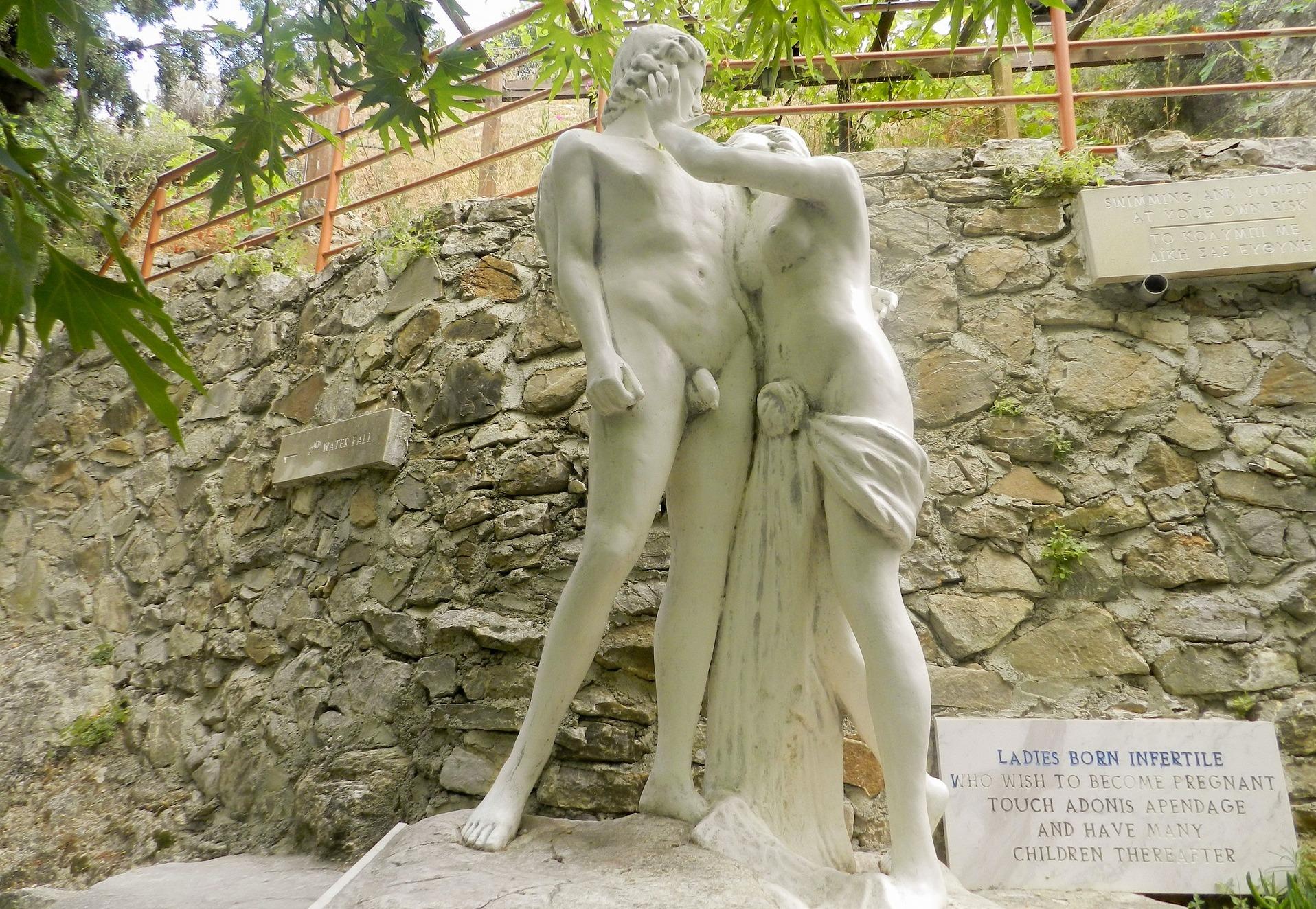Since ancient times, the inhabitants of our planet have universally and methodically created legends, myths and prophesies.
One of the reasons for their appearance was the need to explain certain phenomena and facts. Despite its modest size, Cyprus has witnessed the greatest number of epochal events in its heroic history. The intertwining of religions and cultures, interests and destinies has given rise to many legends and tales. Here is a selection of folklore that reveals the secrets of this Mediterranean nation's past.
The fate of Aphrodite
The most famous figure in Cypriot mythology is Aphrodite, the goddess of beauty, love and fertility. According to legend, she appeared in the form of a woman from the sea foam near the rock of Petra tou Romiou on the southwest coast of Paphos. According to the same legend, all women must circle the rock three times in order to find true love and happiness. Another version of the appearance of the goddess says that she was born in an ordinary earthly way and was the daughter of Uranus (father of heaven) and the goddess of rain, Dione. After her birth she travelled to Mount Olympus to take her place among the gods. It was here that Aphrodite was given her name. The goddess of love and beauty was said to be quite amorous.
The heroine of the legend met one of her lovers, Adonis, in the eastern part of the island. In those days, Aphrodite's husband was a rather famous figure - Hephaestus, the god of fire and patron of all blacksmiths. Unlike his wife, he was ugly, so Zeus chose him to be Aphrodite's husband. Hephaestus showered his wife with luxurious gifts. In particular, palaces made of gold and precious stones. But Aphrodite continued to have affairs, including with Ares, the god of war. When her husband found out, he cast an invisible net over the bed of infidelity and caught the lovers at the scene of the crime. Hephaestus then invited all the gods to the scene. The husband demanded the death of Aris for adultery. But Aris was saved by the god of the sea, Poseidon, who paid a considerable ransom for her freedom. Aphrodite returned to her baths near Paphos, which are still visited by tourists today.

Aphrodite and the Trojan War
In a way, this legend is intertwined with the plot of the famous Hollywood film Troy. During the wedding of King Peleus of Thessaly to the sea nymph Thetis, Erida, the goddess of chaos and discord, went on a revelry without being invited to the wedding feast. However, she did sneak into the wedding and threw a golden apple marked 'most beautiful' into the room, causing a row between Hera (patroness of marriage and protector of the mother during childbirth), Athena (goddess of wisdom and war) and Aphrodite. Each was certain that the apple was addressed to her. It was up to Zeus to settle the dispute. But at his request, the Trojan prince Paris was entrusted with the task of restoring the truth. It is easy to imagine that each of the goddesses tried to interest him: Hera offered wealth and power, Athena promised skill and wisdom, while Aphrodite offered him the most beautiful woman in the world.
In the end, Paris accepted Aphrodite's offer, arousing the enmity of the other goddesses. While waiting for the beautiful woman, Paris, accompanied by Aphrodite's son Aeneas, travelled to Sparta, where he was met by King Menelaus and his wife Helen, the world's first beautiful woman. During their visit, Menelaus was forced to leave for Crete, leaving Helen alone to entertain the guests. The next day, the Trojans swooped down, kidnapped Helen and took her to Troy. It was Aphrodite, the goddess of persuasion Peitho and the god of love Eros who bewitched the beauty and made her believe that her real husband was Paris and not Menelaus. A storm at sea forced the fugitives to seek refuge in Cyprus. These events marked the beginning of the Trojan War.

The two lives of Adonis
Like Ares, the god of war, Adonis was one of Aphrodite's favourite conquests. Enraged by feelings of jealousy, Ares turned into a ferocious wild boar and began terrorising the inhabitants of the city, killing them with utter cruelty. Word of his cruelty spread throughout Cyprus. Adonis, an avid hunter, did not take Aphrodite's warnings seriously and set out to destroy the bloodthirsty beast. During the battle, the vulture attacked Adonis and mortally wounded him. Aphrodite, who rushed to his aid, was too late, and the drops of blood from the slain Adonis turned into flowers. Grief-stricken, Aphrodite begged Zeus to bring back her beloved. He turned to the Queen of the Underworld, the Parthenon. But she too fell in love with the young man and refused to let him leave her kingdom. Adonis then divided his time between the two goddesses.
The Baths of Adonis
Not far from Paphos are the Baths of Adonis. According to legend, he and Aphrodite had many children, who were the ancestors of the modern inhabitants of the city. The goddess Artemis also had something to do with these baths. She was very jealous of the couple's love and threw a golden almond into the water in the hope that Adonis would find it, get trapped and drown in the baths. Fortunately, he was saved by Poseidon, the god of the sea.

Pygmalion and Galatea
There was a king in Cyprus called Pygmalion. He was a creative man and in his spare time he carved stone statues. One day he created a statue of a woman so beautiful and perfect that he fell in love with her and named her Galatea. Aphrodite took pity on the amorous king-sculptor and breathed life into the statue, transforming it into a living female. Pygmalion and Galatea's love blossomed and soon the couple had a son named Paphos. He later became the founder of the city of the same name, which he built in gratitude for his birth.
Atlantis and golden apples
Immediately after her birth, a girl named Atlantis was abandoned to her fate by her parents and grew up in a forest thicket. Possessing a fairytale beauty from an early age, she made it a condition of her marriage that suitors had to win a running contest. Among those willing to take part in the tournament was the son of King Poseidon - Hippomenaeus. Atlantis fell in love with him overnight and begged him not to enter the competition, as it was impossible to change the rules. To save her lover, the girl used a trick: she picked golden apples from a Cypriot apple tree and asked Hippomenaeus to scatter them along the path of the competitors. She began to collect the apples herself during the race, which helped her beloved young man to win.

Ruler Kyniras
In Greek mythology, Kinyras was the ruler of Cyprus. According to legend, he offered magic lats to Agamemnon, king of Mycenae, when he heard that the Greeks were about to sail for Troy. Despite his promise to send fifty ships to help the Greeks, Kyniras reneged and sent forty-nine clay statues - imitators - along with a ship. This infuriated Agamemnon, who cursed him and was subsequently killed by his father Apollo. He later brought the murdered man back to life with the help of Asclepius, the god of healing. Kyniras was renowned as a creator of art and musical instruments. He was famous for his striking beauty and was the father of many children, including Adonis' mother Myrrh.
The brave warrior Digenis
In ancient times the island was home to the giant Digenis. It is said that he travelled from Asia Minor across the Mediterranean and ended up in Cyprus. During this time, the islanders were not at ease, as robbers were known to attack the land. They came in squadrons with their own cavalry, plundering towns, destroying temples and taking the islanders as slaves. Once, when Digenis saw the ships approaching Cyprus, he became enraged, grabbed a huge boulder and threw it at his enemies. As it flew, it shattered into many deadly fragments, sending the entire enemy squadron to the bottom of the sea. From then on, brigands stopped attacking Cyprus, and the people gave Digenis the name Akrit, which means 'defender of the borders'.

A castle with 101 rooms
There was a beautiful and rich Queen Regina in Cyprus. One day she decided to build a castle in the mountains. The building was to have 101 rooms: one hundred accessible rooms and one secret room. The secret room's door was to be opened once every forty years, for twenty-four hours only. The queen watched over the construction of the castle and when it was finished, she executed all the builders to prevent them from revealing the secret of its construction. Legend has it that this room contained untold treasures that still thrill adventurers today. One day, a group of young men set out in search of the hundred and first room. They wandered for a long time through the deserted rooms of the castle and finally came upon a mossy door. When the searchers opened the door, the room was illuminated by flashes of light reflected from jewels and gold coins. The boys immediately began to divide the treasure among themselves, unaware that the day was coming to an end, the sun was setting, and the door to the secret room was closed again for 40 years. The members of the treasure expedition fell into a dreamless sleep during this time, and when they awoke, they forgot what they had found and ran to their home village. Here they were greatly disappointed: their parents did not wait for them and died, their friends and wives grew old, and their children did not remember their fathers.
The centaurs of Cyprus
Centaurs appeared on the island of Cyprus after the god Zeus persistently tried to woo the less famous Aphrodite. The twelve most important of these creatures later became the spirits that guarded Dionysus as an infant. The main characteristic of the Cypriot centaurs is the presence of bull horns. Unlike their Thessalian counterparts, they represented fertility rather than virility. Nevertheless, the centaurs were not devoid of animal nature. Dionysus later called them into service in his army after Zeus ordered him to attack India.

Read also:

